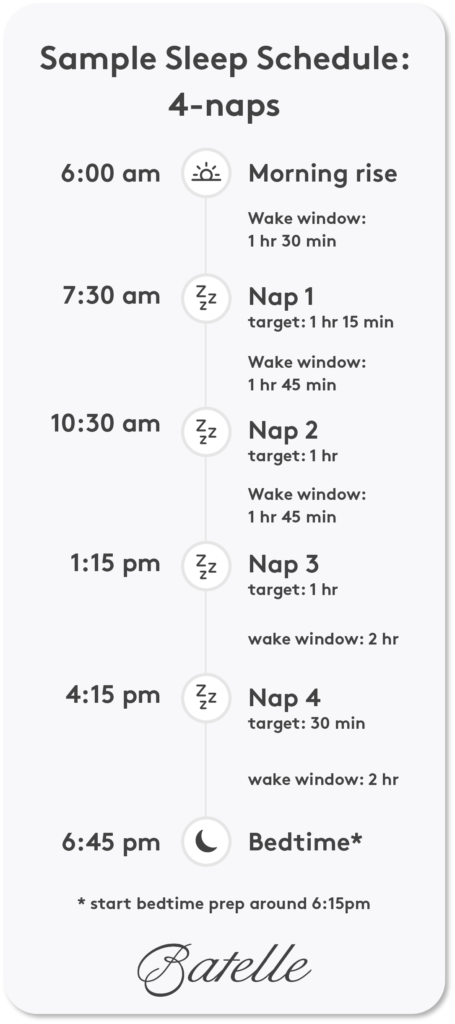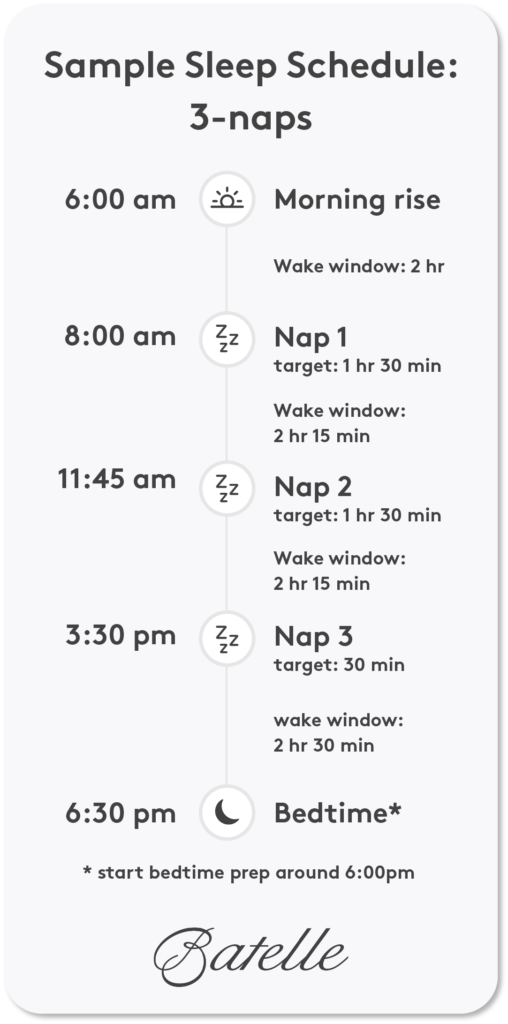
GET STARTED WITH A FREE CUSTOM SCHEDULE AND PLAN OVERVIEW ON OUR MOBILE APP →
TRY BATELLE FOR FREE →

At 5 months, your baby is unfolding a new chapter of growth and discovery, and, yes, sometimes sleep problems. If you’ve found yourself typing “5-month sleep regression” into a search bar, know that you’re in good company. Many parents grapple with sleep challenges during this time, seeking answers and understanding. But here’s the thing: every baby’s journey at this age—and indeed, at any age—is as unique as they are.
Recent research by DeMasi and colleagues (2023) provides insights into the relationship between a baby’s movement and sleep. As babies engage with new skills, their sleep patterns may be affected. The key takeaway is that sleep disturbances often correlate more with what a baby is currently learning than with their specific age. While it’s common to attribute sleep challenges to certain age markers, it’s perhaps more accurate to consider the individual developmental milestones each baby is navigating. So is there a 5-month sleep regression? It’s certainly possible as every baby’s developmental journey is distinct, and their sleep patterns can vary based on the skills and challenges they’re encountering at any given time.
In this article, we’ll explore the developmental milestones your baby might be working on at 5 months that could be contributing to a 5-month sleep regression, and offer sleep tips to help you understand and support your baby’s sleep patterns, whatever they may be this month.
At 5 months, your baby is blossoming in various ways, both physically and cognitively. They’re not just growing in size but also in their ability to interact with the world around them. Each of these milestones, while exciting, can also influence your baby’s sleep patterns, making some nights more restless than others and contributing to a 5-month sleep regression.
By the time your little one reaches 5 months, you’ve likely noticed a shift in their sleep patterns. They have transitioned away from erratic newborn sleep and may have moved through the effects of the 4-month sleep regression.
Similar to 3 months, this age sometimes marks another stable plateau in their development, offering a brief respite after periods of intense growth before they move into the 6-month sleep regression. No matter what’s going on for your little one this month, maintaining a consistent bedtime routine can offer a sense of security and predictability for your baby which can help everyone get better sleep.
Additionally, as your 5-month-old becomes more mobile and begins to roll, it’s vital to prioritize safe sleep practices. Always place your baby on their back for sleep, as recommended by the American Academy of Pediatrics (AAP) to reduce the risk of Sudden Infant Death Syndrome (SIDS). But don’t worry, if your little one rolls over on their own during sleep, there’s no need to reposition them as long as their sleep environment is safe.
While they’re laying the groundwork for future skills like self-soothing, some 5-month-olds might hit certain milestones earlier than others, and that’s okay. The key is to provide a supportive environment, celebrate each achievement, and remember that growth and development don’t follow a strict timeline.
Naptimes might be getting a little tricky about now – especially the last nap of the day. One of the most significant sleep transitions at this age is the shift from 4 to 3 naps. While this might sound like a small change, it can have a considerable impact on your baby’s nap schedule.
As your baby approaches the 5-month mark, you might notice certain signs indicating they’re ready to transition from four naps to three. These signs can include:
Transitioning from 4 to 3 naps isn’t like flipping a switch. It’s entirely normal for babies to fluctuate between 3 and 4 naps during this period. Some days, they might seem ready for just three naps, while on other days, they might benefit from that extra snooze. It’s essential to remain flexible and responsive to your baby’s cues during this transition.
Short naps are still developmentally appropriate. At 5 months, babies often experience a range of nap durations. Some naps might be brief (only a single sleep cycle), offering a quick recharge, while others provide a deeper rest. Both short and long naps play a important role in your baby’s day, contributing to their overall well-being and development.
That said, ensuring your baby is napping at the right times is important. If your baby is overtired or undertired it can lead to shorter naps. It’s all about finding that sweet spot where your baby is tired enough to sleep deeply but not so exhausted that they become restless. This balance is where a consistent sleep schedule can be helpful.
While you’re navigating the unique sleep patterns of your 5-month-old, you might be tempted to try and find the “perfect” schedule. As highlighted in our guide on optimal sleep schedules, it’s important to understand that there’s no one-size-fits-all approach.
If your current sleep approach is working for your 5-month-old baby, there’s no need to adjust. However, if you’re encountering sleep challenges, it might be time to consider a more structured routine. The goal is to find what best supports your baby’s sleep needs and adapt as necessary.
Some families thrive on strict routines, while others find success in tuning into their baby’s natural cues. The overarching theme? Adaptability. As your baby continues to grow and change, their sleep needs will evolve, and being flexible can make this journey smoother for both of you. We’ve created a schedule tool that will help you have flexibility in your day, while also meeting your little one’s need.


If you’re considering introducing more structure to your 5-month-old’s routine, our free sleep schedule generator is a great place to start.
At 5 months old, your little one is getting closer to having the skills to be able to find ways to self-soothe. If you’re considering sleep training, it’s a good time to take a look at how you are helping your baby get to sleep and work on setting up sustainable sleep routines that work for you as well as your baby. If what you are doing only works for your baby, it’s not going to be sustainable in the long run.
Reaching the 5-month milestone is a testament to your baby’s ongoing journey of discovery and growth. This period might be characterized by both the consolidation of past skills and the anticipation of new ones on the horizon. Your baby’s unique developmental path will shape these experiences. Amidst the challenges and changes, the constants are patience, understanding, and adaptability. Celebrate the moments of calm, and remember that every phase, no matter how challenging, is temporary.
If you have any concerns about your baby’s sleep habits, feeding, development, or any other aspect of their health, don’t hesitate to consult your pediatrician. For more information on sleep regressions at other ages, check out this blog on sleep regressions here.
